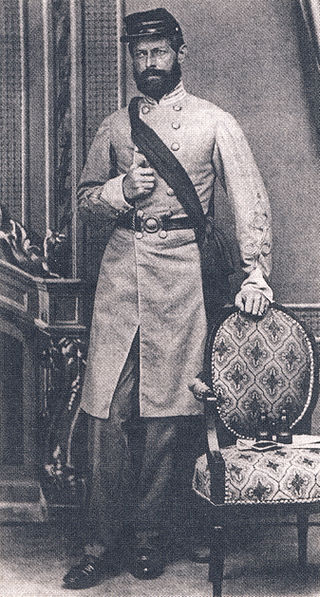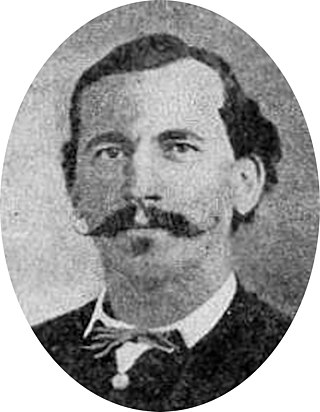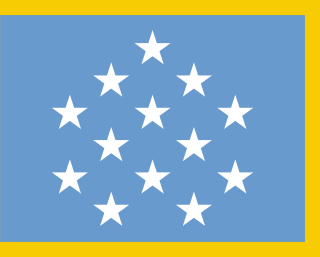
Henry Wirz was a Swiss-born American military officer and convicted war criminal who served in the Confederate States Army during the American Civil War.

The Sons of Confederate Veterans (SCV) is an American neo-Confederate nonprofit organization of male descendants of Confederate soldiers that commemorates these ancestors, funds and dedicates monuments to them, and promotes the pseudohistorical Lost Cause ideology and corresponding white supremacy.

Jay R. Vargas is a retired United States Marine Corps colonel who served in the Vietnam War. He received the Medal of Honor for "conspicuous gallantry and intrepidity at the risk of his life above and beyond the call of duty" in 1968.

The Southern Cross of Honor was a commemorative medal established in 1899 by the United Daughters of the Confederacy to honor Confederate Veterans.

Loren Robert Kaufman was a soldier in the United States Army during the Korean War. He received the Medal of Honor for his actions on 4–5 September 1950 during the Battle of Yongsan. He was later killed in action before being awarded the Medal of Honor and is buried at Willamette National Cemetery.

William Samuel Sitman was a soldier in the United States Army during the Korean War. He posthumously received the Medal of Honor for his actions on February 14, 1951, during the Battle of Chipyong-ni.

Ernest Edison West was a United States Army soldier and a recipient of the United States military's highest decoration, the Medal of Honor, for his actions during the Korean War.

Walter Joseph "Joe" Marm Jr. is a retired United States Army colonel and a recipient of the United States military's highest decoration for valor, the Medal of Honor, for his actions in the Vietnam War.
Private Christopher Freemeyer was a German-born soldier in the U.S. Army who served with the 5th U.S. Infantry during the Indian Wars. He was one of thirty-one men who received the Medal of Honor for gallantry during General Nelson A. Miles campaign against the Sioux Indians in the Montana Territory from October 1876 to January 1877.

James Jardine was a Union Army soldier during the American Civil War. He received the Medal of Honor for gallantry during the Siege of Vicksburg on May 22, 1863.

William Taylor was a Union Army soldier and officer during the American Civil War. He received the Medal of Honor for gallantry during two separate Virginia engagements. The Battle of Front Royal in 1862 and the Battle of Globe Tavern in 1864.
Julius Henry Stickoffer was a Swiss-born American soldier in the U.S. Army who served as a saddler with the 8th U.S. Cavalry during the Black Hawk War. Stickoffer was cited for gallantry in action against hostile Indians at Cienaga Springs in the Utah Territory on November 11, 1868, for which he received the Medal of Honor two years later. He was the only member of the United States armed forces to win the award during the seven-year conflict.

Christopher C. Bruton (1841–1867) was a Union Army officer during the American Civil War. He received the Medal of Honor for gallantry during the Battle of Waynesboro, Virginia fought on March 2, 1865. It was the final battle for Confederate Lt. Gen. Jubal Early, whose force was destroyed.

The Medal of Honor (MOH) is the United States Armed Forces' highest military decoration and is awarded to recognize American soldiers, sailors, marines, airmen, guardians, and coast guardsmen who have distinguished themselves by acts of valor. The medal is normally awarded by the President of the United States and is presented "in the name of the United States Congress."

Jose Rodela is a United States Army veteran of the Vietnam War and a recipient of the Medal of Honor.

Miguel Armando "Nando" Vera was a United States Army soldier who was killed in the Korean War and a posthumous recipient of the Medal of Honor for his actions during the Battle of Old Baldy.
Father Emmeran M. Bliemel, OSB, was a Benedictine Catholic priest who died in the Battle of Jonesborough during the American Civil War, becoming the first chaplain killed in action in any American battle. While serving as Chaplain of the 10th Tennessee Regiment, he ministered to the spiritual needs of wounded soldiers, under fire as well as behind the lines. He was decapitated by a cannonball while giving the last rites to Colonel William Grace. Bliemel also ministered to the soldiers of the 4th Kentucky Infantry.
The New Market Cross of Honor was a commemorative medal established in 1904 by the Virginia Military Institute Alumni Association (VMIAA) to honor Confederate veterans who served in the Virginia Military Institute Corps of Cadets at the Battle of New Market during the American Civil War.














